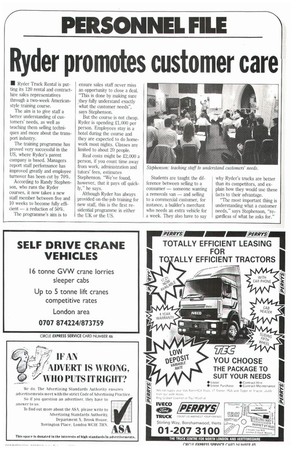Ryder promotes customer care
Page 71

If you've noticed an error in this article please click here to report it so we can fix it.
• Ryder Truck Rental is putting its 120 rental and contracthire sales representatives through a two-week Americanstyle training course.
The aim is to give staff a better understanding of customers' needs, as well as teaching them selling techniques and more about the transport industry.
'Me training programme has proved very successful in the US, where Ryder's parent company is based. Managers report staff performance has improved greatly and employee turnover has been cut by 70%.
According to Randy Stephenson, who runs the Ryder courses, it now takes a new staff member between five and 10 weeks to become fully efficient — a reduction of 50%.
The programme's aim is to ensure sales staff never miss an opportunity to close a deal. "This is done by making sure they fully understand exactly what the customer needs", says Stephenson.
But the course is not cheap. Ryder is spending 21,000 per person. Employees stay in a hotel during the course and they are expected to do homework most nights. Classes are limited to about 20 people.
Real costs might be 22,000 a person, if you count time away from work, administration and tutors' fees, estimates Stephenson. "We've found, however, that it pays off quickly," he says.
Although Ryder has always provided on-the-job training for new staff, this is the first residential programme in either the UK or the US. Students are taught the difference between selling to a consumer — someone wanting a removals van — and selling to a commercial customer, for instance, a builder's merchant who needs an extra vehicle for a week. They also have to say why Ryder's trucks are better than its competitors, and explain how they would use these facts to their advantage.
"The most important thing is understanding what a customer needs," says Stephenson, "regardless of what he asks for."




















































































































